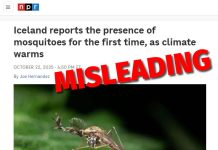Editor’s Note: The media seems to have gotten their marching orders. Multiple news outlets, including The Guardian, The Daily Express, and Gavi, The Vaccine Alliance, among others, published stories on the same day saying malaria and other mosquito borne diseases are on the rise in unusual locations due to climate change. We at Climate Realism have refuted similar claims multiple times in the past, here, here, and here, for instance. As detailed in Chapter Four of Climate Change Reconsidered II: Fossil Fuels, the vast body of scientific literature refutes the recent mainstream media claims that climate change is likely to exacerbate the spread of mosquito borne diseases. Studies from Africa, to England and Wales, to North and South America, to Thailand and beyond refute any link between climate change and the spread of malaria, Dengue fever, West Nile virus, and other vector-borne diseases.
In this post guest analyst, Eric Worrall, uses classic literature, historical accounts, and scientific studies to show that malaria has historically been common in non-tropical areas, like Europe, the United Kingdom, and the United States, until modern societies learned to suppress them with medical and pesticide interventions. If such diseases become make a comeback in the future, it will not be because the climate has changed, making it new areas suddenly more conducive to malaria bearing mosquitos, but rather because we are no longer using the interventions which defeated such diseases in these regions and countries in the recent past.
Guest Essay by Eric Worrall
Famous British playwright William Shakespeare wrote about endemic Malaria in Britain in the 1500s. Malaria was the scourge of Scandinavia and Russia right up until the 20th century. But this has not stopped greens falsely claiming Malaria is a disease of warm climates.
Mosquito-borne diseases spreading in Europe due to climate crisis, says expert
Illnesses such as dengue and malaria to reach unaffected parts of northern Europe, America, Asia and Australia, conference to hear
Helena Horton Environment reporter Thu 25 Apr 2024 14.00 AEST
Mosquito-borne diseases are spreading across the globe, and particularly in Europe, due to climate breakdown, an expert has said.
The insects spread illnesses such as malaria and dengue fever, the prevalences of which have hugely increased over the past 80 years as global heating has given them the warmer, more humid conditions they thrive in.
Prof Rachel Lowe who leads the global health resilience group at the Barcelona Supercomputing Center in Spain, has warned that mosquito-borne disease outbreaks are set to spread across currently unaffected parts of northern Europe, Asia, North America and Australia over the next few decades.
…
“Global warming due to climate change means that the disease vectors that carry and spread malaria and dengue [fever] can find a home in more regions, with outbreaks occurring in areas where people are likely to be immunologically naive and public health systems unprepared,” Lowe said.
“The stark reality is that longer hot seasons will enlarge the seasonal window for the spread of mosquito-borne diseases and favour increasingly frequent outbreaks that are increasingly complex to deal with.”
…
Studying Shakespeare is, or was until recently, a staple of British education. So why do people swallow the mistruth that Malaria is a tropical disease? Why doesn’t everyone know about Shakespeare’s references to Malaria?
The reason is back in Shakespeare’s day, they called Malaria something else. Shakespeare’s 16th century word for fevers like Malaria and Dengue was “Ague“.
From Open Source Shakespeare;
| 1 | Henry IV, Part I [III, 1] |
Hotspur (Henry Percy) | 1611 | Home without boots, and in foul weather too! How ‘scapes he agues, in the devil’s name? |
| 2 | Henry IV, Part I [IV, 1] |
Hotspur (Henry Percy) | 2337 | No more, no more: worse than the sun in March, This praise doth nourish agues. |
| 3 | Henry VIII [I, 1] |
Duke of Buckingham | 40 | An untimely ague Stay’d me a prisoner in my chamber when Those suns of glory, those two lights of men, Met in the vale of Andren. |
| 4 | Julius Caesar [II, 2] |
Caesar | 1093 | As that same ague which hath made you lean. What is ‘t o’clock? |
| 5 | King John [III, 4] |
Constance | 1455 | As dim and meagre as an ague‘s fit, And so he’ll die; and, rising so again, When I shall meet him in the court of heaven I shall not know him: therefore never, never Must I behold my pretty Arthur more. |
| 6 | King Lear [IV, 6] |
Lear | 2706 | ‘Tis a lie- I am not ague-proof. |
| 7 | Macbeth [V, 5] |
Macbeth | 2353 | Hang out our banners on the outward walls; The cry is still ‘They come:’ our castle’s strength Will laugh a siege to scorn: here let them lie Till famine and the ague eat them up: Were they not forced with those that should be ours, We might have met them dareful, beard to beard, And beat them backward home. [A cry of women within] What is that noise? |
| 8 | Merchant of Venice [I, 1] |
Salarino | 24 | My wind cooling my broth Would blow me to an ague, when I thought What harm a wind too great at sea might do. |
| 9 | Richard II [II, 1] |
King Richard II | 799 | Presuming on an ague‘s privilege, Darest with thy frozen admonition Make pale our cheek, chasing the royal blood With fury from his native residence. Now, by my seat’s right royal majesty, Wert thou not brother to great Edward’s son, This tongue that runs so roundly in thy head Should run thy head from thy unreverent shoulders. |
| 10 | Richard II [III, 2] |
King Richard II | 1598 | This ague fit of fear is over-blown; |
| 11 | Tempest [II, 2] |
Stephano | 1156 | This is some monster of the isle with four legs, who hath got, as I take it, an ague. |
| 12 | Tempest [II, 2] |
Stephano | 1178 | If all the wine in my bottle will recover him, I will help his ague. Come. Amen! I will pour some in thy other mouth. |
| 13 | Tempest [II, 2] |
Stephano | 1221 | how does thine ague? |
| 14 | Timon of Athens [IV, 3] |
Timon | 1815 | Enough to make a whore forswear her trade, And to make whores, a bawd. Hold up, you sluts, Your aprons mountant: you are not oathable, Although, I know, you ‘ll swear, terribly swear Into strong shudders and to heavenly agues The immortal gods that hear you,—spare your oaths, … |
| 15 | Troilus and Cressida [III, 3] |
Patroclus | 2111 | O, then, beware; Those wounds heal ill that men do give themselves: Omission to do what is necessary Seals a commission to a blank of danger; And danger, like an ague, subtly taints Even then when we sit idly in the sun. |
| 16 | Venus and Adonis | Shakespeare | 761 | ‘As burning fevers, agues pale and faint, Life-poisoning pestilence and frenzies wood, The marrow-eating sickness, whose attaint Disorder breeds by heating of the blood: Surfeits, imposthumes, grief, and damn’d despair, Swear nature’s death for framing thee so fair. |
Sixteen references in Shakespeare’s plays – Ague was an important factor in people’s lives in Britain in the 1500s.
Ague was a changer of battles, a metaphor for fear or a sign of divine punishment, a disease which caused a burning fever with shaking, pale skin (anaemia) and weight loss, a disease whose worst phases left people bedridden, a disease which was stronger during Spring, when mosquitoes become active: “the sun in March, This praise doth nourish agues“.
Ague was Malaria.
The point is Malaria infection was prevalent enough to be referenced sixteen times by Shakespeare, during the Little Ice Age, during the period frost fairs were held on the River Thames, which froze solid enough in winter for people to walk around on the ice. Malaria is not a tropical disease.
The American CDC also provides evidence that tropical weather is not the main driver of Malaria;
From Shakespeare to Defoe: Malaria in England in the Little Ice Age
Paul Reiter
Author affiliation: Centers for Disease Control and Prevention, San Juan, Puerto Rico
Abstract
Present global temperatures are in a warming phase that began 200 to 300 years ago. Some climate models suggest that human activities may have exacerbated this phase by raising the atmospheric concentration of carbon dioxide and other greenhouse gases. Discussions of the potential effects of the weather include predictions that malaria will emerge from the tropics and become established in Europe and North America. The complex ecology and transmission dynamics of the disease, as well as accounts of its early history, refute such predictions. Until the second half of the 20th century, malaria was endemic and widespread in many temperate regions, with major epidemics as far north as the Arctic Circle. From 1564 to the 1730s—the coldest period of the Little Ice Age—malaria was an important cause of illness and death in several parts of England. Transmission began to decline only in the 19th century, when the present warming trend was well under way. The history of the disease in England underscores the role of factors other than temperature in malaria transmission.
…
Read more: https://wwwnc.cdc.gov/eid/article/6/1/00-0101_article
Why is Malaria, or Ague, re-emerging in Europe?
Nobody knows for sure why Ague went away. Several factors such as widespread draining of swamps and more understanding of how to control mosquitoes helped. Even a shift to smaller households likely contributed.
One factor which could be driving the re-emergence of Ague in Europe and North America is the mass importation of people who are infected with Malaria. I’m not making any comment on the moral rights or wrongs of Europe and the USA’s generous asylum policies, but importing people who carry Malaria, without rigorous vetting and medical management of their condition, is a major public health risk.
The mosquitoes which can carry Malaria are very much still a presence in Europe, Britain and the United States, especially given green efforts over the last few years to eradicate the use of effective pesticides and to preserve or restore wetlands instead of draining the swamp.
Increase in imported malaria in the Netherlands in asylum seekers and VFR travellers, Brechje de Gier, et al.
Malaria Journal volume 16, Article number: 60 (2017) Cite this article
Abstract
Background
Malaria is a notifiable disease in the Netherlands, a non-endemic country. Imported malaria infections occur regularly among travellers, migrants and visitors. Surveillance data were analysed from 2008 to 2015. Trends in amounts of notifications among risk groups were analysed using Poisson regression. For asylum seekers, yearly incidence was calculated per region of origin, using national asylum request statistics as denominator data. For tourists, denominator data were used from travel statistics to estimate incidence per travel region up to 2012.
Results
A modest increase in overall imported malaria notifications occurred in 2008–2015 (from 222 in 2008 to 344 in 2015). Notably, in 2014 and 2015 sharp increases were seen in malaria among travellers visiting friends and relatives (VFR), and in asylum seekers. Of all Plasmodium falciparum infections, most (1254/1337; 93.8%) were imported from Africa; 1037/1337 (77.6%) were imported from Central and West Africa. Malaria in VFR was mostly caused by P. falciparum infection after visiting Ghana (22%) or Nigeria (19%). Malaria in asylum seekers was mostly caused by Plasmodium vivax infection from the Horn of Africa. The large number of notifications in asylum seekers resulted from both an increase in number of asylum seekers and a striking increase of malaria incidence in this group. Incidence of malaria in asylum seekers from the Horn of Africa ranged between 0.02 and 0.3% in 2008–2013, but rose to 1.6% in 2014 and 1.3% in 2015. In 2008–2012, incidence in tourists visiting Central and West Africa dropped markedly.
Conclusions
Imported malaria is on the rise again in the Netherlands, most notably since 2013. This is mostly due to immigration of asylum seekers from the Horn of Africa. The predominance of P. vivax infection among asylum seekers warrants vigilance in health workers when a migrant presents with fever, as relapses of this type of malaria can occur long after arrival in the Netherlands.
Read more: https://malariajournal.biomedcentral.com/articles/10.1186/s12936-017-1711-5
I don’t want to overplay the risk. If a significant Malaria outbreak did occur in a modern country, it could be controlled by stepping up mosquito fogging programs, mass spraying of pesticides in residential areas, and large scale treatment of known sources of mosquitoes. Centuries of experience dealing with Malaria have taught us how to combat it, simple low cost measures like spraying swamps with kerosene or other chemicals to kill mosquito larvae, and public vigilance and cleanup campaigns to eradicate stagnant water near residential homes, could all contribute to containing an outbreak.
We have a large body of knowledge from past successes, the product of centuries of desperate efforts to combat the scourge. But people who were infected before the outbreak was contained would have a rough time, especially if they were infected with one of the emerging drug resistant strains of Malaria which are increasingly prevalent in poor countries. And it is an open question whether today’s green obsessed politicians would act decisively, and authorize immediate large scale treatment of natural wetlands adjacent to the outbreak, or would dither and delay until mass outrage at the growing number of casualties forced them to act.













![frost-faire-malaria[1]](https://climaterealism.com/wp-content/uploads/2024/04/frost-faire-malaria1-696x348.webp)









If anything, increased international travel may be spreading malaria.